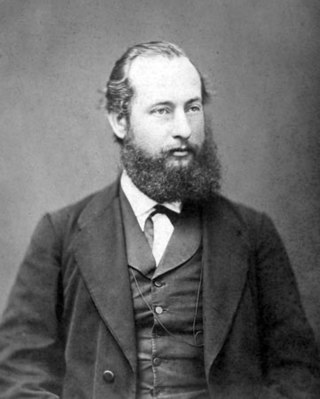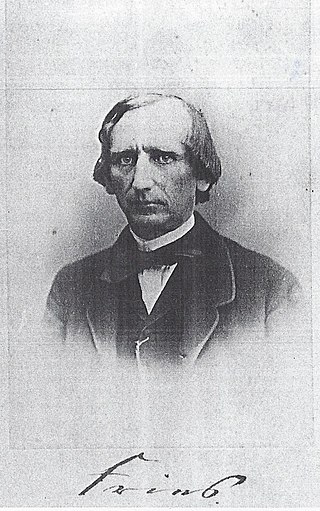
The Bundestag is the German federal parliament. It is the only federal representative body that is directly elected by the German people, comparable to the United States House of Representatives or the House of Commons of the United Kingdom. The Bundestag was established by Title III of the Basic Law for the Federal Republic of Germany in 1949 as one of the legislative bodies of Germany and thus it is the historical successor to the earlier Reichstag.

The North German Confederation was initially a German military alliance established in August 1866 under the leadership of the Kingdom of Prussia, which was transformed in the subsequent year into a confederated state that existed from July 1867 to December 1870. A milestone of the German Unification, it was the earliest continual legal predecessor of the modern German nation-state known today as the Federal Republic of Germany.

The National Liberal Party was a liberal party of the North German Confederation and the German Empire which flourished between 1867 and 1918.
Elections in Germany include elections to the Bundestag, the Landtags of the various states, and local elections.

Federal elections were held in Germany on 5 March 1933, after the Nazi seizure of power on 30 January 1933 and just six days after the Reichstag fire. The election saw Nazi stormtroopers unleash a widespread campaign of violence against the Communist Party (KPD), left-wingers, trade unionists, the Social Democratic Party of Germany, and the Centre Party. They were the last multi-party all-German elections until 1990.

Wilhelm Hasenclever was a German politician. He was originally a tanner by trade but later became a journalist and author. However, he is most known for his political work in the predecessors of the Social Democratic Party of Germany (SPD).
The Saxon People's Party was a left-liberal and radical democratic party with socialist leanings in Germany, founded by Wilhelm Liebknecht and August Bebel on 19 August 1866 in Chemnitz, and integrated into the newly-founded Social Democratic Workers' Party (SDAP) on 8 August 1869. It was an alliance between liberal, anti-Prussian bourgeois and socialist workers' organizations in Saxony. It is considered one of the precursors to the Social Democratic Party of Germany.

The chancellor of Germany, officially the federal chancellor of the Federal Republic of Germany, is the head of the federal government of Germany, and the commander in chief of the German Armed Forces during wartime. The chancellor is the chief executive of the Federal Cabinet and heads the executive branch. The chancellor is elected by the Bundestag on the proposal of the federal president and without debate.

Albert Hänel was a German jurist, legal historian and liberal politician. He was one of the leaders of the German Progress Party, and served as Rector of the University of Kiel. He served as a member of the Prussian Chamber of Deputies, the Reichstag of the North German Confederation and the Imperial Reichstag, and was Vice President of both the Prussian Chamber of Deputies and the Imperial Reichstag.

The Reichstag of the German Empire was Germany's lower House of Parliament from 1871 to 1918. Within the governmental structure of the Reich, it represented the national and democratic element alongside the federalism of the Bundesrat and the monarchic and bureaucratic element of the executive, embodied in the Reich chancellor. Together with the Bundesrat, the Reichstag had legislative power and shared in decision-making on the Reich budget. It also had certain rights of control over the executive branch and could engage the public through its debates. The emperor had little political power, and over time the position of the Reichstag strengthened with respect to the Bundesrat.

The Reichstag of the Weimar Republic (1919–1933) was the lower house of Germany's parliament; the upper house was the Reichsrat, which represented the states. The Reichstag convened for the first time on 24 June 1920, taking over from the Weimar National Assembly, which had served as an interim parliament following the collapse of the German Empire in November 1918.

The Reichstag, officially the Greater German Reichstag after 1938, was the national parliament of Nazi Germany from 1933 to 1945. Following the Nazi seizure of power and the enactment of the Enabling Act of 1933, it functioned purely as a rubber stamp for the actions of Adolf Hitler's dictatorship — always by unanimous consent — and as a forum to listen to Hitler's speeches. In this purely ceremonial role, the Reichstag convened only 20 times, the last on 26 April 1942. The President of the Reichstag throughout this period was Hermann Göring.

The Reichstag of the North German Confederation was the federal state's lower house of parliament. The popularly elected Reichstag was responsible for federal legislation together with the Bundesrat, the upper house whose members were appointed by the governments of the individual states to represent their interests. Executive power lay with the Bundesrat and the king of Prussia acting as Bundespräsidium, or head of state. The Reichstag debated and approved or rejected taxes and expenditures and could propose laws in its own right. To become effective, all laws required the approval of both the Bundesrat and the Reichstag. Voting rights in Reichstag elections were advanced for the time, granting universal, equal, and secret suffrage to men above the age of 25.

Elections to the Constituent Reichstag of the North German Confederation were held on 12 February 1867, with run-off elections during the following weeks. The National Liberal Party emerged as the largest party, winning 80 seats and receiving strong support in Hanover, Kassel and Nassau. Voter turnout was around 65% in Prussian constituencies. After the Constituent Reichstag had drawn up and agreed a constitution, fresh elections were held in August.

Elections to the Zollparlament of the German Zollverein were held in February and March 1868. The Zollparlament consisted of the members of the Reichstag of the North German Confederation and members from the South German states. Those South German members were elected in these elections, the North Germans were the Reichstag members elected the previous year.
The North German Confederation Treaty was the treaty between the Kingdom of Prussia and other northern and central German states that initially created the North German Confederation, which was the forerunner to the German Empire. This treaty, and others that followed in September and October, are often described as the August treaties, although not all of them were concluded in August 1866.

Hugo Friedrich Fries. sometimes spelt Frieze, was a German judge, and son of Jakob Friedrich Fries. Before and after the founding of the German Reich, he was a member of the Reichstag. His son, Otto Fries (1849–1905), a forester, was also a member of the Reichstag.
The Reichstag deputies of the Kingdom of Saxony were elected by male suffrage over the age of 25 across the Kingdom of Saxony from 1867 until the abolition of the Kingdom in 1918.

Friedrich Wilhelm Emil Försterling was a German Social Democratic politician. He was President of the General German Workers' Association (ADAV) and a member of the Reichstag of the North German Confederation.

The Chemnitz Reichstag constituency was constituency No. 16 in the Kingdom of Saxony which returned a deputy to the German Reichstag. It was based upon what was the town of Chemnitz.




















